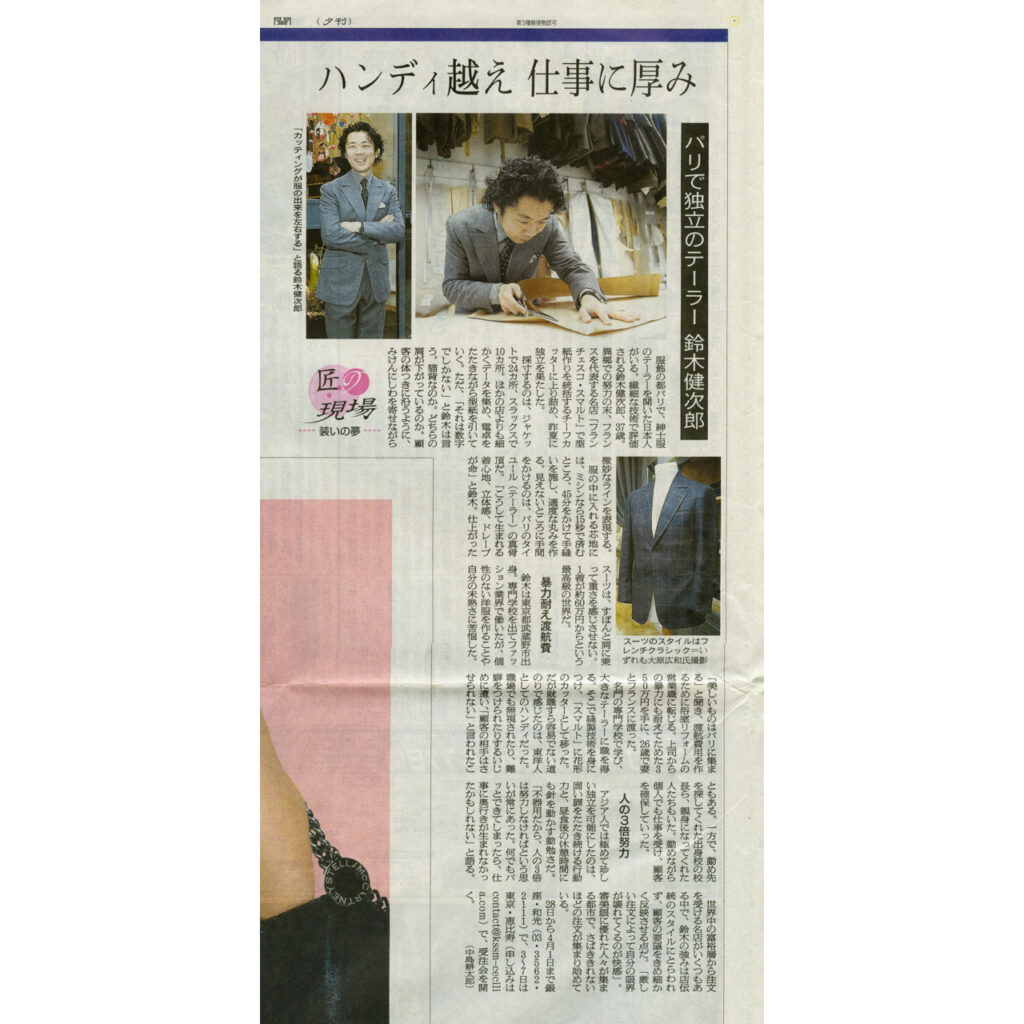Against all odds of becoming a Japanese bespoke tailor in Paris, Kenjiro Suzuki has managed to fulfill his long-time dream.
After arriving in the fashion capital of the world, Suzuki, 37, made a heroic effort, and eventually managed to become the chief cutter–in charge of creating the crucial patterns–at the exclusive Francesco Smalto, a major bespoke operation and fashion brand in France, before opening his own tailoring house in Paris last summer.
What led to the opening of his tailoring operation was not luck but true grit. Suzuki never gave up. He kept on pounding on doors that refused to open; he diligently worked with his needle during his lunch breaks.
“I was constantly driven by the notion that I had to work three times as hard as other people because I lacked the skill,” he reminisced. “But if I was able to do everything perfectly at one go, it would have been too easy. And I might not have been able to add depth to my work.”
He is meticulous about his tailoring. Suzuki, who is known for his detailed styling and fine techniques, does not cut any corners. He takes 24 measurements for the jacket alone; 10 for the slacks. Suzuki works from a much-detailed set of data compared to other tailoring houses. He busily taps figures into a calculator as he carefully draws up his patterns. According to Suzuki, the process is far from complete. “I only have numbers at this point,” he said.
Now Suzuki has to figure out how to flesh out the pattern. He considers all kinds of variables, noting countless elements to get things just right. Is the client round-shouldered, which shoulder tends to drop, and so on. Suzuki works with such concentration that he has a furrowed brow as he draws delicate lines to create a pattern that faithfully follows the contours of the respective client.
The bespoke tailoring process takes many hours of tailoring. Suzuki insists on hand-sewing the batting to create a discrete, natural curve. The work takes a full 45 minutes, which could be completed in a mere 15 seconds with a sewing machine. He doesn’t skimp on work even for parts that don’t show. That is what makes French tailors so special, and Suzuki is proud of being a French “tailleur.”
“This is how we create the fit, the three-dimensional effect and the natural drape,” he explained. “It is the essence to custom-made tailoring.”
The finished suit hugs the shoulders light and snug, and the wearer hardly feels the weight at all. These are extremely high-end suits. Prices start around 600,000 yen ($5,870).
Suzuki was born in Musashino, Tokyo. After graduating from a vocational school, he worked in the fashion industry for some time. But he struggled with his own lack of experience. And he was unhappy that he had to make clothes that were so lacking in character.
When he heard that “all beautiful things can be found in Paris” he decided to make a change. He took a bathroom remodeling sales job. He endured physical abuse from his boss while clinging to the belief that he was going to move to Paris. All the while, he saved 3.5 million yen. Suzuki was 26 when he and his wife headed off to France.
There, he studied at a top vocational school. Upon graduation, he found a job with a major tailoring house where he honed his sewing technique. He then moved on to Smalto. He was taken on as a cutter, the most prestigious and desired position. It was a long, tough road for Suzuki, and finding a job in France had been a daunting task.
He was constantly made aware of the fact that he was from a different culture. He was snubbed at the workplace, and sometimes rebuked for nothing. Once he was told outright that he “was not allowed to deal with clients directly.” Still, Suzuki had a group of supporters whom he could count on. The director of the vocational school believed in him and helped him with his first job. Suzuki took on private customers whenever he could, gradually building a clientele basis.
In Paris, there are many first-class tailors that take on well-to-do clients from all over the world. Besides being an independent Asian tailor trained in the French tradition, what makes Suzuki unique is the fact that he has not been caught up in an established house style. He is flexible enough to accommodate requests from his clients and execute them in fine detail.
“I find it challenging to stretch myself and break down boundaries when I handle all kinds of difficult requests,” he said. “It is satisfying.”
Suzuki is thriving in a city filled with people with a keen sense of aesthetics. He has a growing customer base and these days, finds himself getting swamped with orders.
Suzuki is in Tokyo through April 2 at Wako department store in Ginza, and in Ebisu from April 3-7 to take orders for tailor-made suits.
By KOTARO NAKAJIMA/ Staff Writer




